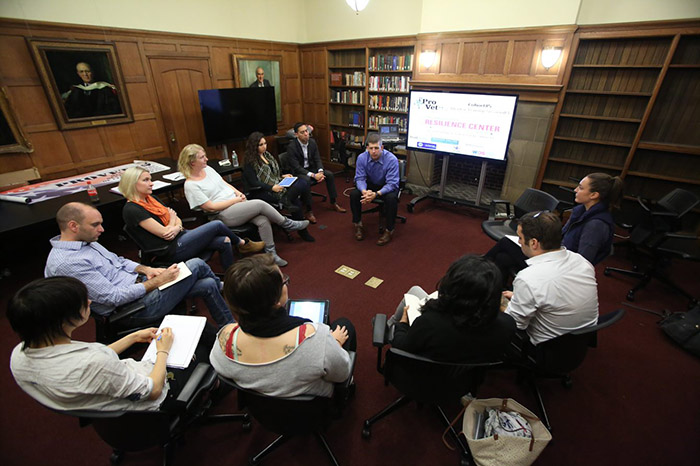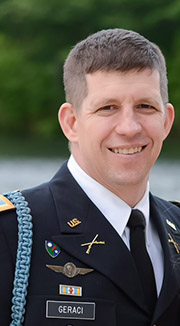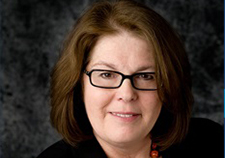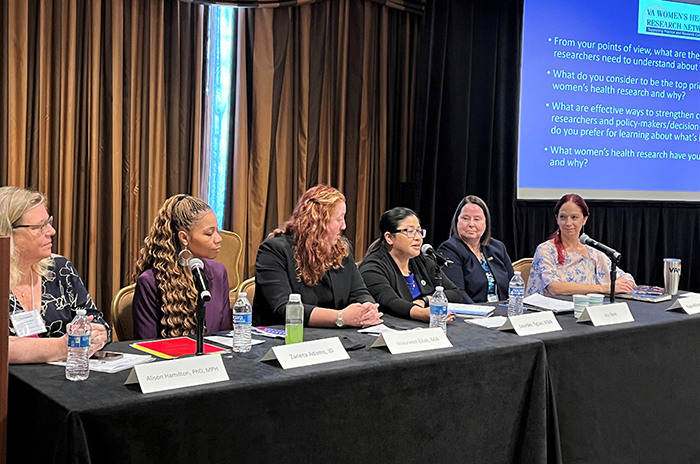Office of Research & Development |
 |


Dr. Joseph Geraci discusses his experiences transitioning out of the military as he certifies a group of people who have volunteered to help service members reintegrate into society. (Photo by Bruce Gilbert)
August 30, 2021
By Mike Richman
VA Research Communications
"We as post-9/11 Veterans are very resilient and can make significant and positive contributions to society. But at the same time, our military service and the difficulties we face reintegrating to civilian life make us one of the highest-risk Veteran populations."
Dr. Joseph Geraci fought on the battlefront in Afghanistan. After 9/11, he deployed four times to the country as an Army combat leader with elite special operations, ranger, airborne, and infantry units. He risked his life on multiple missions and lost comrades like one who was killed in a gun battle after being ambushed by more than 100 Taliban fighters.
He retired in 2018 as an infantry lieutenant colonel and is now a clinical psychologist at the James J. Peters VA Medical Center in the Bronx, New York. He’s affiliated with the VISN 2 Mental Illness Research, Education and Clinical Centers (MIRECC).
Like many of the more than 4 million Veterans or active-duty personnel who have served since 9/11, he’s battling a sense of heartbreak, frustration, and confusion following the U.S. withdrawal from Afghanistan and the subsequent Taliban takeover of the country—the same Taliban that harbored al-Qaida terrorists who planned the 9/11 attacks.
Was our service for naught, he and others are asking themselves? What did our nation get in return for us sacrificing so much blood and treasure over the past 20 years? Will I be welcomed back as I try to transition to civilian life?
 Geraci, an Army Veteran, deployed four times to Afghanistan and earned multiple honors, including the Bronze Star, the Air Medal, and Combat Infantryman Badge.
Geraci, an Army Veteran, deployed four times to Afghanistan and earned multiple honors, including the Bronze Star, the Air Medal, and Combat Infantryman Badge.
With this in mind, Geraci believes his role as a clinical psychologist and as co-director of the Transitioning Servicemember/Veteran and Suicide Prevention Center (TASC) is more urgent than ever. With co-director Dr. Marianne Goodman and the TASC team, Geraci studies and develops programs aimed at reducing the reintegration difficulties of Veterans and preventing suicide.
Within the TASC, Geraci leads two national VA initiatives that focus on reintegration and seek to bridge the Veteran-civilian divide: Veteran Cultural Competence Training, a day-long experience through which VA and non-VA professionals gain a new perspective on Veteran identity and emotional experiences; and VA’s Transitioning Servicemember/Veteran Sponsorship Initiative, which assesses the effectiveness of service members being helped by volunteer and certified sponsors from nonprofit endeavors.
Geraci spoke to VA Research Currents about the mental and social challenges he expects post-9/11 Veterans to face, whether or not they served in Afghanistan:
VA Research Currents: What kinds of patients do you see?
Geraci: Most of the Veterans we see in the TASC are recently transitioned Veterans with combat experience who struggle with reintegration to civilian life. Many times, these struggles manifest as acute suicide risk, anxiety, depression, PTSD, substance use, and adjustment disorder. Some of our patients are still on active duty, are on VA’s high-risk suicide list, and-or were assigned to us prior to discharge from our VA in-patient facility.
How vulnerable are your patients and post-9/11 Veterans in general to experiencing mental disorders, including suicidal thoughts, from what has transpired in Afghanistan?

VA Researcher Named One of U.S.’ Top Female Scientists

2023 VA Women's Health Research Conference

Self-harm is underrecognized in Gulf War Veterans
We as post-9/11 Veterans are very resilient and can make significant and positive contributions to society. But at the same time, our military service and the difficulties we face reintegrating to civilian life make us one of the highest-risk Veteran populations. In fact, the suicide rate has doubled for the youngest post-9/11 Veterans over the last 13 years. Our research shows that it isn’t just the combat. It isn’t just the PTSD. It’s also the reintegration difficulties we face as we transition. These difficulties greatly increase the risk for suicide. Therefore, in one of our publications, we describe the period between exiting the military and successful reintegration as the “deadly gap.”
When combined with what is currently being played out in Afghanistan—which can be viewed by some as a form of moral injury—it has the potential to leave us more susceptible to psychological challenges. Processing the emotions related to the Afghanistan withdrawal may be a sizeable burden for some Veterans that can weigh them down. It is yet another heavy rock for them to carry in their “rucksacks.” At this point, it’s just anecdotal, but I am concerned that the situation in Afghanistan is going to increase the suicide risk for some post-9/11 Veterans. Therefore, I am thankful that my VA colleagues have posted many of the VA and non-VA resources available to post-9/11 Veterans.
Having been on multiple deployments to Afghanistan as a combat leader, how are you feeling about the U.S. withdrawal and the Taliban takeover in the country?
My initial reaction was anger. All of my patients are Veterans who recently served. Their initial response has been one of anger, too. In session, I encourage them to explore the emotions under the anger. It’s important for me to do a similar exploration. The anger is just at the surface masking deeper and more prominent emotions. Of the deeper emotions for me, one is sadness.
We volunteered to serve and to contribute to something bigger than ourselves. We underwent years of grueling training to perfect our professional competence so we could bring to fruition the Army Ranger creed: “I shall defeat (the enemy) on the field of battle, for I am better trained and will fight with all my might. Surrender is not a Ranger word…and under no circumstance will I ever embarrass my country.” We then left our families many times and missed many holidays and birthdays, as we risked our lives on the front lines in Afghanistan.
We gave so much for our nation’s mission in Afghanistan, including our blood, sweat, and tears. Looking at the legacy of some of the units that I deployed with to Afghanistan, we accomplished so much: building schools and roads, bolstering Afghan governance, and reducing threats from the Taliban and other insurgents. Up until two weeks ago, I was very confident that never again would a massive attack on our nation be initiated in Afghanistan. And then almost in the blink of an eye, it’s like our 20 years of service, sacrifices, and accomplishments were wiped away.
One of my sons is named after my close comrade who fought with me in Afghanistan and was killed there. Why did he—Tommy Bostick—and other comrades have to die like Todd Clark, Jamie Leonard, and many, many others for something that is being portrayed in the media as an absolute failure, disaster, and crisis? So yes, sadness is very much below the anger and is paramount.
Another emotion under the anger is fear for our Afghan partners who we fought with side by side. My first deployment was with the Army Rangers just months after 9/11. So from our earliest involvement in Afghanistan, I’ve witnessed firsthand the atrocities the Taliban is capable of: killing an entire Afghan police force and decapitating the police chief; torturing and mutilating Afghan interpreters who worked for us; and conducting complex ambushes and planting roadside bombs intended to kill us. To prevent further attacks, we would conduct air assault raids with our Afghan partners to kill or capture the insurgents, some of whom ended up in the Guantanamo Bay detention camp or the Bagram Air Base prison. As I’ve read reports in recent days of the Taliban releasing prisoners from Bagram and hunting down, door-by-door, the Afghan partners that we fought with, I’ve become very fearful for our Afghan partners.
What are the bumps in the road that you foresee in terms of reintegration?
I like to talk about this through Maslow’s hierarchy of needs, a psychological theory that states that people are motivated to satisfy higher-order needs after their current needs are met. As we discussed in one of our recent peer-reviewed articles, one of the basic stages of needs consists of love and belongingness. In the military, we have a very tight feeling of camaraderie. As we transition to civilian life, we can feel very disconnected from society because there are far fewer people, supervisors, family members, and colleagues to whom we can relate. So many Veterans grapple with questions like, “Do I feel I belong in my local community?”
We know that reduced levels of love, belongingness, and connectedness can increase the risk for suicide. The recent events in Afghanistan may create an additional bump for some post-9/11 Veterans because their civilian counterparts can’t relate to the emotions we are now experiencing, thus causing Veterans to feel even more disconnected. So it’s been critical for me to go to my TASC team, my family, my VA health care providers, and my fellow Veteran support network to help me process the emotions that I have experienced in recent weeks. It’s important that Veterans do not suffer in silence!
The goal is to satisfy needs at the highest stage, which is self-actualization, or finding a sense of purpose in life and fulfilling one’s potential. As a professional and voluntary military, we support and defend the U.S. Constitution and subjugate ourselves to our nation’s civilian leaders in a symbiotic relationship built upon trust. The military “deploys, fights, and wins the nation’s wars,” and the civilian leadership determines the national defense strategy, which wars to fight, and how our nation defines mission success and failure. Many of us felt we derived a sense of purpose from applying our military skills to accomplish our mission in Afghanistan.
The most significant bump that post-9/11 Veterans may face because of the withdrawal is they may internalize the reports of Afghanistan being described as a failure. This may make them feel unfulfilled and empty, and to perceive that their sacrifices in Afghanistan were meaningless and of no value to society and civilian leaders. Our identity and sense of purpose as Veterans can become anchored to our good and bad experiences in the military. The lack of purpose and fulfillment can be related to symptoms of depression and PTSD severity after military service.
I’m very thankful that VA took a chance on hiring me and provided me my current role. The work that our team is doing within the TASC is more important now than ever before. It helps me to serve my fellow post-9/11 Veterans in a way that helps me feel like I’m accomplishing my sense of purpose.
Could we possibly see a “Vietnam” scenario where returning service members and post-9/11 Veterans are disrespected by the U.S. civilian population?
A growing number of post-9/11 Veterans are serving in state and U.S. legislative branches, as well as in other elected positions. They have become advocates for Veterans. Additionally, I have been honored to be mentored by so many Vietnam Veterans. A motto that continues to be echoed by many Vietnam Veterans is “never again.” Never again will they allow our nation to treat its Veterans the way that they were treated. I’m forever grateful and appreciative to them. Because of their sacrifices and the commitment of public servants, I’m confident that our nation will continue to respect our post-9/11 Veterans.
Are you encouraging your patients to take advantage of VA resources like the Veterans Crisis Line?
Yes, the Veterans Crisis Line is a phenomenal resource for Veterans experiencing a crisis. I make sure my patients have the phone number (1-800-273-8255, press 1) as part of their safety plan. At the same time, our goal within the TASC is to apply a universal and public health approach to suicide that strives to prevent a crisis from occurring. We advocate for community-based programs that galvanize the community to successfully reintegrate post-9/11 Veterans and help them achieve self-actualization through a “new mission” that supports their community. The Transitioning Servicemember/Veteran Sponsorship Initiative (TSM/V) is one example of this. It’s a non-monetary collaboration between community-based nonprofit agencies, local communities, private industry, VA, and the Department of Defense.
The initiative is evidence-based and connects service members before discharge. It links them with a sponsor in their post-military hometown and helps to ensure they have the skills and resources needed to achieve their educational, employment, family, social, and medical goals. Anyone—Veteran or not—can become a sponsor. Although sponsors receive training in how to spot signs of suicide risk, TSM/V sponsorship is more than a suicide prevention initiative. It’s an initiative for helping new Veterans connect with their communities and build stable and satisfying post-military lives. We encourage people to sign up as sponsors.
VA Research Currents archives || Sign up for VA Research updates